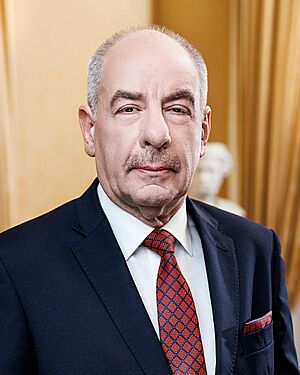Tamás Sulyok facts for kids
Quick facts for kids
Tamás Sulyok
|
|
|---|---|

Official portrait, 2024
|
|
| 7th President of Hungary | |
| Assumed office 5 March 2024 |
|
| Prime Minister | Viktor Orbán |
| Preceded by | Katalin Novák |
| President of the Constitutional Court | |
| In office 22 November 2016 – 4 March 2024 |
|
| Appointed by | National Assembly |
| Preceded by | Barnabás Lenkovics |
| Succeeded by | László Salamon (acting) |
| Member of the Constitutional Court | |
| In office 27 September 2014 – 4 March 2024 |
|
| Appointed by | National Assembly |
| Hungarian Honorary Consul to Austria | |
| In office 2000–2014 |
|
| Personal details | |
| Born |
Tamás Sulyok
24 March 1956 Kiskunfélegyháza, Hungary |
| Political party | Independent |
| Spouse | Zsuzsanna Nagy |
| Children | 2 |
| Alma mater | University of Szeged |
| Occupation |
|
Tamás Sulyok (born on March 24, 1956) is a Hungarian lawyer and politician. He has been serving as the President of Hungary since March 2024. Before becoming president, he was the head of the Constitutional Court from 2016 to 2024.
Contents
Tamás Sulyok's Journey to Presidency
Early Career and Constitutional Court Role
Tamás Sulyok was chosen to be a judge on the Constitutional Court of Hungary in 2014. This court makes sure that all laws in Hungary follow the country's main rules, called the Constitution. He became the president of this important court in 2016. During his time there, he oversaw several important decisions.
Becoming President of Hungary
In February 2024, Tamás Sulyok was chosen by the Fidesz party to be their candidate for President of Hungary. This happened after the previous president, Katalin Novák, resigned. Her resignation followed a difficult situation involving a pardon.
The National Assembly, which is Hungary's parliament, approved his nomination on February 26, 2024. Most members voted for him, with 134 votes in favor. He took his oath of office that day. However, he officially started his role as president on March 5, 2024.
President Sulyok's First Actions
When Tamás Sulyok became president, he shared his goals. He said he wanted to follow the law very carefully. He also wanted to stay out of everyday political arguments in Hungary.
He also spoke about the European Union's actions against Hungary. He felt that the idea of "rule of law" was being used in a way that wasn't always fair. He stressed that countries in the EU should keep their own legal independence.
One of his first official acts as president was very important. On March 5, 2024, he signed a bill. This bill officially approved Sweden joining the North Atlantic Treaty Organization (NATO).
External Links
| Legal offices | ||
|---|---|---|
| Preceded by Barnabás Lenkovics |
President of the Constitutional Court 2016–2024 |
Succeeded by Imre Juhász |
| Political offices | ||
| Preceded by Katalin Novák |
President of Hungary 2024–present |
Incumbent |
See also
 In Spanish: Tamás Sulyok para niños
In Spanish: Tamás Sulyok para niños
 | Aurelia Browder |
 | Nannie Helen Burroughs |
 | Michelle Alexander |

